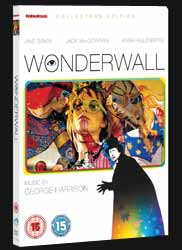|
Click here to return to the main site. DVD Review
Oscar Collins is the epitome of an eccentric professor, living alone, the only female who comes into his home is the cleaning lady. One day Collins spots a shaft of light coming from the wall he shares with his neighbours, Penny and her boyfriend. Drawn to the source the professor looks through the gap and sees penny doing a model shot. Entranced by her beauty and drawn in by the riotous colours of their flat, Collins starts to make more holes, creating his own wonder wall... Wonderwall (1968) is a film directed by Joe Massot from a Guillermo Cabrera Infante script. The film has an odd history. Originally shown at Cannes, to some praise, it failed to secure a distribution deal leading to the notion that it was so bad that no one would show it. Now is your chance to decide for yourselves with this digitally restored version. The tale is a simple one of a lonely man, Collins (Jack MacGowran) becoming obsessed with a vision of beauty. It is so much of a vision that actress Jane Birkin (Penny Lane, I kid you not) doesn’t even get any lines; she remains for him the perfect representation of unrequited desire. Iain Quarrier as the unnamed boyfriend does get a few, mostly around borrowing sugar and ice. You can see why the professor would be drawn to this strange new world as the film juxtaposes his own drab apartment with the riot of colour in Penny’s. His flat holds piles of books and papers, companions to his solitary life, theirs holds a siren song of life. Much of the film passes without speech, often in the form of dream sequences, the imagery of which swings between the obvious and the ridiculously obscure. I got that countering a sword with a pen reiterates the idea that the word is stronger than the sword, but then apparently this is beaten by cigarettes and an electric drill, but then the film was made in a time of psychedelic happenings and apparent great poverty as displayed by the film's characters having to share a single large cigarette amongst many people. Most people will seek out the film not because of the story or even the actors, but because George Harrison wrote the score. Not used to this he used the opportunity to forward his interest in Indian music. The score does give the dream sequences an added level of strangeness, which works well. The film is a child of its times and shares a sensibility with Vadim’s Barbarella, also released in the same year, so like Vadim’s film its best to approach it as a peek back into the days where innocence hadn’t yet been crushed. The disc contains two versions of the film, the original theatrical release (1 hr, 32 min, 01 sec) and a director’s cut (1 hr, 14 min, 53 sec). Given that the print has been hanging around for nearly half a century is has brushed up well. The disc comes with a number of extras, publicity stills galleries and text files which are publicity and cast biographies. Then we move to The Comic Art of Jack MacGowran (2 min, 11 sec) which looks at the comic skills of the film’s star. The Art of Marijke (1 min, 28 sec) lets you have a more leisurely look at the paintings used to segment the film and lastly Reflection on Love (12 min, 08 sec) is the short film which eventually led to making the feature. So it’s a little piece of history and this is probably the best way to approach the film. 6 Charles Packer Buy this item online
|
|---|


